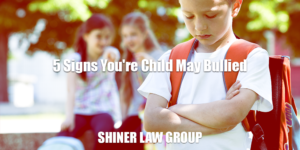
signs of bullying, reducing bullying, bullying
Though strong efforts have been made in recent years to reduce bullying in schools, it remains shockingly common. According to statistics collected by the National Center for Education Statistics and the Bureau of Justice, almost one in three children are bullied in school at some point between grades 6 and 12. About 10% are bullied online during this period, a number that jumps to 15% during high school.
Certain groups are disproportionately more likely to be bullied. LGBT students report a rate of online bullying at over 55%. As little as 20% of all students who are bullied will actually report it to an adult in their life, however.
Kids have trouble processing bullying and are very often reluctant to talk about it. It’s therefore important for parents to recognize signs of bullying and be proactive about engaging with their children when it appears to be happening to prevent child injury.
Shiner Law Group would like to share 5 of the most common signs of bullying.
1. Suddenly Attempting To Skip School, Leave Early Or Miss After-School Activities
A sudden tendency towards truancy or a loss of engagement with extracurricular activities may be a sign that a child is attempting to avoid a situation in which they are being bullied. A number commonly shared in news stories is that 160,000 kids skip school every day due to bullying, but a 2013 report in The Atlantic found that estimate was outdated by about two decades. Nevertheless, more recent surveys indicate that as many as 5% of all students nationwide may skip out on at least part of their school day due to fears of bullying.
2. Sudden Negative Emotional Changes
Children who are being bullied will very often develop anxiety or depression when they showed no signs of these conditions before. Their emotional turmoil also frequently manifests as a lack of appetite, trouble sleeping, sudden bursts of irrational anger or withdrawal from hobbies they were formerly very enthusiastic about. Though this is an extreme example, bullying can also cause kids to develop violent tendencies. 12 of the 15 school shootings that occurred in the 1990s were perpetrated by a child who had been subject to a pattern of bullying.
3. A Drop In Academic Performance
If kids suddenly start underperforming academically, bullying may well be the cause. They may be skipping certain periods of school where the bullying is taking place, or they may be putting in less effort due to feelings of depression and anger.
4. Changes In Fashion
If your child suddenly takes to wearing long pants, long sleeves or covering certain specific parts of their body when they did not before, they may be covering up signs of a personal injury. Why would a child hide this? Often it is because they are afraid that they will be told by adults to physically fight back, which they are not prepared to do (nor is this good advice). They may also inexplicably dispose of a piece of clothing, backpack or books that have become damaged due to an altercation.
5. Increased And Sudden Need For Money
If a bully is extorting a child or the child is bribing them to leave them alone, they may start asking for money unexpectedly or even taking money. They may also sell their own possessions or other items from around the house to obtain these funds.
The impact of bullying in school lingers far into adult life. It puts adults at increased risk for development of mental health issues and substance abuse. Becoming an adult doesn’t grant you an automatic escape from the world of bullying, either; a significant percentage of the population also experiences bullying in the workplace.
If you or your child have experienced bullying, the intervention of a bullying abuse attorney may be helpful if other avenues have failed. Carefully document the incidences of bullying, and contact us at 561-777-7700 for a free immediate consultation. Whether it is a case of school or workplace bullying, a civil suit can be a highly effective way of putting an end to it and obtaining fair compensation.